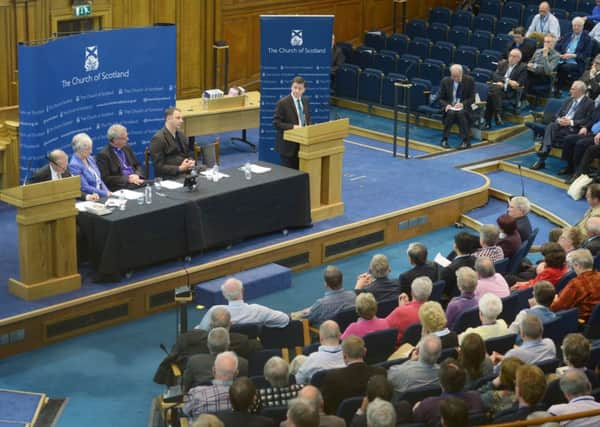Our society is rooted in Christianity


THE Church of Scotland and the Free Church both held fascinating debates on the question of Scottish independence during their recent assemblies. Both were models of courtesy, intelligence and passion, although they were not without their faux pas. My favourite was the Church of Scotland minister with a lack of historical perspective who unfortunately proclaimed himself as a Christian National Socialist!
Meanwhile, on a different planet, the Scottish Secular Society announced that it was coming out in favour of an independent Scotland because an independent Scotland would be more secular and would guarantee “equality and inclusion”. This is a chilling Orwellian refrain that in practice will mean the exclusion and marginalisation of all who do not buy into the values and faith of the new absolutist state.
Advertisement
Hide AdAdvertisement
Hide AdIt is a point which was picked up by Dr John Ross of the Free Church, who warned that voting for independence would be taking Scotland out of “Christian” Britain.
Lorna Hood, the former moderator of the Church of Scotland, was also concerned that the secularists would take the opportunity to get Christianity out of Scotland if Scotland got out of the UK.
The more militant secularists, of course, maintain that they are not out to get rid of religion; they just want to get rid of it from public life. There should be no Christian influence, which they describe as “privilege”, in government, education, health, media etc. Leave Scotland’s Christianity in the past and let us move on to a brand new secular nirvana. Religions will be permitted in this Brave New World, as long as we are happy to be relegated to the status of knitting circles and Trekkie conventions.
The Church of Scotland meanwhile is understandably concerned that it will lose its diminishing status as the national Kirk. Whilst it continues to do vital work in many areas of Scotland and has a membership that is 400 times greater than the tiny secular society, that membership is in free-fall and with less than 2 per cent of the population attending the Kirk on any given Sunday, it is difficult to argue that it should continue as the national Kirk in a post- independence Scotland. Does this mean that the secularists are right? Should we have an entirely secular constitution, which guarantees freedom of religion and is neutral on all religious issues?
That is impossible. Why? Because it rests on the myth of secular neutrality. The secularists have a very definite philosophy and set of values. In removing the Christian values of our society we are not entering into a moral and philosophical neutral vacuum. We will all be compelled to accept the values of secularism. Pro-abortion, pro-euthanasia, pro-same-sex marriage will be de rigueur if one is to be part of this wonderful new world.
Neutrality is a myth that the faith of the secularists seeks to proclaim without any evidence. It is also a dangerous myth because anyone who believes without evidence that their position is the only neutral one will automatically disparage and discount anyone who disagrees with them. Those who think their beliefs are self-evident, obvious and unquestionable usually end up being the most intolerant of fundamentalists.
My proposal is straightforward. We cannot forget our history. The supposed secular values of equality, diversity and tolerance do not stem from secular philosophy but are rather rooted and grounded in Christianity. When we throw away the roots we are in grave danger of losing the fruits. So let any new constitution for Scotland be a Christian one, which recognises Scotland’s foundational roots in Christianity and espouses Christian values for the present and future.
Any constitution has to be based on shared values. Why should we not continue with the Christian ethos and values that our nation has been founded on?
Advertisement
Hide AdAdvertisement
Hide AdWe are not seeking for a national Church, but rather a national recognition of Christianity. This does not discriminate but rather guarantees the freedom of other religions and viewpoints. It is for that reason that most of the Muslims I know would prefer to live in a secular Christian rather than a secular humanist country and why they are keen to send their children to Catholic schools.
The United States Declaration of Independence contains one of the best-known sentences in the English language: “We hold these truths to be self-evident, that all men are created equal, that they are endowed by their Creator with certain unalienable Rights, that among these are Life, Liberty and the pursuit of Happiness.” The world’s greatest “secular” country was founded on Christian principles.
The truths that we hold to be self-evident are only self-evident if we accept Christian presuppositions that all human beings are created by God and endowed by their Creator with certain inalienable rights. If we remove that Christian basis to our society, we also remove those rights and make them alienable – subject to the whims and fashions of the powerful, wealthy elites. That may suit the powerful, wealthy elites but is it any basis for a modern progressive democratic society?
If we genuinely want the fruits of a fair, just and tolerant Scotland, then the best way is to ensure that we recognise, build upon, and do not destroy our Christian roots.
• David Robertson is director at Solas Centre for Public Christianity www.solas-cpc.org
SEE ALSO